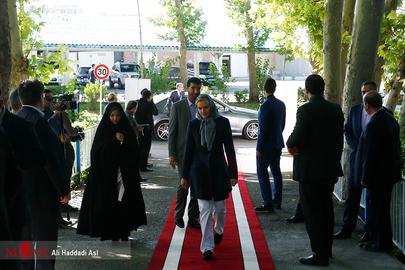On Wednesday July 5, 45 foreign ambassadors to Iran walked across a red carpet spread in their honor and entered the earthly paradise known as Evin Prison. They crossed a corridor lined with magnificent bouquets and then gathered to sit in a pleasant open space under the cool shade of towering trees.
The next day, most of Iran’s domestic newspapers ran reports about how surprised the ambassadors — from Germany, Slovakia, New Zealand and 42 other countries — were to discover the conditions at Evin Prison to be so excellent and agreeable. But when these newspapers were distributed to some Evin Prison wards, the ungrateful inmates were outraged, as one prisoner held at Ward 8 told IranWire. He said inmates characterized the visit in different terms: “Staged”, “phony” and a “sham” were some of the words they used to describe the visit. For hours, whether in the prison yard or after a few of the ambassadors crossed paths with prisoners in the corridors, that was all they talked about. Prisoners were struck by the huge discrepancy between the reports and the reality of Evin Prison as they experience it.
In a glowing report (Persian link), the state-run Young Journalists Club announced that the visit caught the media off guard, especially those outlets that had presented an unreal picture of Iranian prisons and accused Iran of violations of human rights. According to club’s report, the ambassadors saw with their own eyes that life at Evin Prison was as normal as it could be for a prison. Inmates spent their leisure time at the barber, in the kitchen or in the prison’s shop. When the ambassadors arrived, some prisoners were taking summer afternoon naps in rooms furnished with six beds covered in red bed covers, with identical carpets on the floor. Others were whiling away their summer at classes in pottery, English language, calligraphy and music. The food was excellent and the inmates could cook their own if they did not find prison food to their tastes. The library was peerless in the whole of the Middle East. The doors between wards were open and the inmates were wearing clean, ironed clothes. According the Young Journalists Club, the ambassadors were so fascinated by what they saw that they completely lost track of time.
They Might not Even Want to Leave...
At the end of the visit, the ambassadors told handpicked reporters that had accompanied them that they were impressed by what they had seen. The Portuguese ambassador said he had not expected such good conditions and said Evin was a modern prison. The Indian ambassador said that Evin’s strong point was its judicial and prison management systems. And the ambassador from Indonesia quipped that with such good conditions, there might be inmates who would never want to leave the prison.
But preparations for the Evin visit had been going on for some weeks, and prison officials had been busy making the wards presentable. They also transferred “problem” inmates somewhere else.
Hiding away prisoners who have been subjected to torture or who have been kept under harsh conditions is nothing new. In their memoirs, many former political prisoners have talked about the modus operandi of prison officials when a stage-managed visit or inspection is to take place. Presentable wards are selected and prepared for show. Sometimes even false partitions are erected and problem inmates are banished to the side of the barrier that won’t be on view. They are threatened with harsh retaliation if they make the smallest sound while the visit is going on.
Kiarash, an inmate at Evin’s Ward 7, told IranWire that, suddenly, a few days before the visit, the quality of the prison food improved. “‘Believe me,’ I told my cellmate, ‘something is up.’ The next day they called out ward representatives, briefed them and told them that they must control the situation closely, and must make the toilets and the bathrooms shine. The same day they transferred a number of inmates to solitary confinement, those inmates who can never control their tongues and always rise to protest when the warden shows his face.”
Kiarash said that he knew right away that Wards 7 and 8 would not be part of the stage-managed visited. “These wards could not look good no matter how much we scrub it and how much the inmates put their beds, clothes and belongings in order,” he said. “The building is old and decrepit and Wards 7 and 8 are in really sad shape. The ventilation system is broken down and air circulation is non-existent. Sometimes we almost suffocate because there is no air. Bedbugs and insects and big, brown cockroaches climb all over us. Our bodies are usually covered with big, swollen spots as a result of insect bites. Almost all of us suffer from skin disease. Some rooms in Ward 7’s isolation ward — which we call ‘hell’ — have no windows to the outside, not even a small porthole. The inmates usually suffer from muscle ache and are deprived of sun altogether.”
“Consultation” Ward
Kiarash was right. The ambassadors did not visit Wards 7 or 8. Instead, they were taken to Wards 3 and 4. Ward 3 is known as the “Consultation Ward” and operates under the supervision of Zahra Moshir, the wife of Tehran’s Mayor Mohammad Bagher Ghalibaf. “In a situation when other wards are exploding from overcrowding,” an article about the ambassadors’ visit published on the news site Zeitoon reported [Persian link], “when 500 people occupy a space with an anticipated population of 300, Ward 3 has no more than 100 inmates. Prison guards act as their social workers. They do not accept political...and troublesome prisoners. Ward 3 is the prison’s display window, all handpicked and cleaned up.”
The ambassadors also visited the dressmaking workshop where, according to Kiarash, only favored inmates are allowed to work. Those who are in the habit of protesting against prison conditions are banned from the workshop. Mostafa Mohebbi, Director-General of Tehran’s Prisons Organization, told the visiting ambassadors that part of the inmates’ wages are saved and paid to them as a lump sum when they are released. But prisoners say that most of the inmates who work at the workshop use their wages to pay for things like phone calls and other facilities, services that by law should be provided to them free of charge.
Some of the inmates kept at Ward 4, the ward the ambassadors saw, are serving sentences for financial offences or misconduct. A good number of wealthy inmates serving time there can afford to pay for a range of luxuries. According to Kiarash, some Ward 4 inmates are wealthy enough to write a check and buy the whole of Evin Prison. “They buy the ward luxury items,” he said. “They are even allowed to hire internal decorators from outside to do their rooms. They have multi-door refrigerators, sophisticated air conditioners and stylish curtains. One of them might suddenly decide to treat the whole ward to dinner from a famous restaurant. Why don’t they take the ambassadors to the wards holding violent criminals or the one called the Cannibal’s Ward? Or to Ward 8 where you can see before your own eyes drugs changing hands and the opium paraphernalia spread out in the middle of the room?”
For those not held in Ward 4, winter means extreme cold because the heating system is crumbling and dysfunctional. Summer, without a working cooling system, means skin diseases and attacks from harmful insects.
An Invitation for the Indonesian Ambassador
Amir, an inmate at Ward 8, has been worn down by lice. For six months, he had to sleep on the floor. “Where are those chic beds with red covers and identical carpets?” he asked me when I interviewed him. “I wish they would give me one. I have a bad back and chronic pain. Last year when they transferred me to Ward 8, I was not given a bed because of overcrowding beyond the capacity of the ward. As much as I pleaded with them, they wouldn’t give me a mattress or allow my family to bring me one. For six months, I threw a blanket on the floor and slept on it. Recently God took pity on me. A prisoner was released and I was saved from having to sleep on the hard floor.”
According to Amir, at the moment there are bedbugs and cockroaches everywhere and nothing much is done to get rid of them. “Three months ago they disinfected the ward,” he said. “They need to do it every month because the space is closed and the rooms do not have enough light — but the last disinfection was three months ago. The ambassador from Indonesia says that an inmate might want to stay here of his own free will. He should be so kind as to sleep for only one night here on the floor over an old blanket ridden with lice and bedbugs. Then he will find out how many of us wish to remain in prison.”
The ambassadors also visited the 48-bed hospital inside Evin Prison, the place that inmates call “clinic.” Political prisoners have repeatedly protested against the inadequate services provided there. They say that even in the worst situations, like if a prisoner has a broken arm or leg or a serious hemorrhage, the only treatment they received was a few acetaminophen painkillers.
Perhaps this visit from ambassadors served as something of a light painkiller for the officials of the Islamic Republic. Pained by repeated accusations of human rights abuse, perhaps they were hoping the visit would give them some short-term respite.
visit the accountability section
In this section of Iran Wire, you can contact the officials and launch your campaign for various problems




























comments